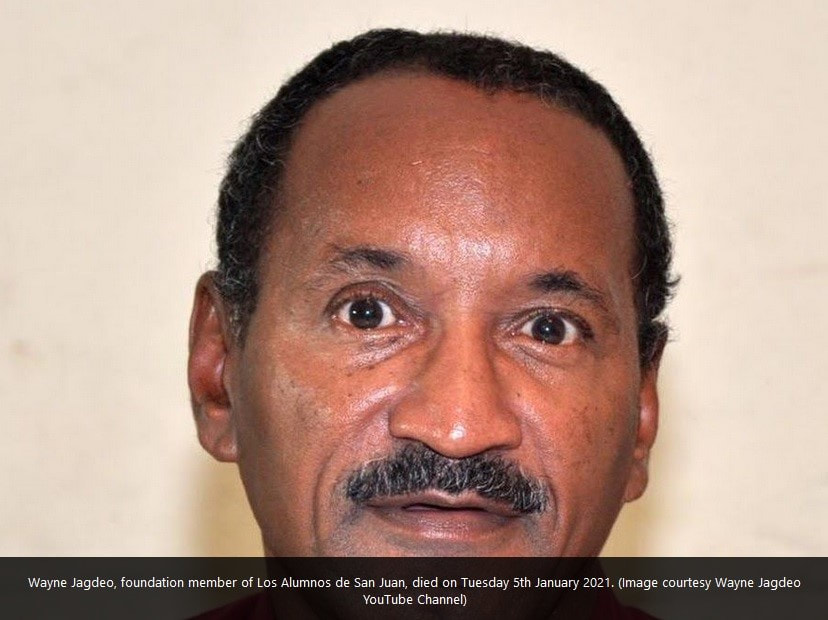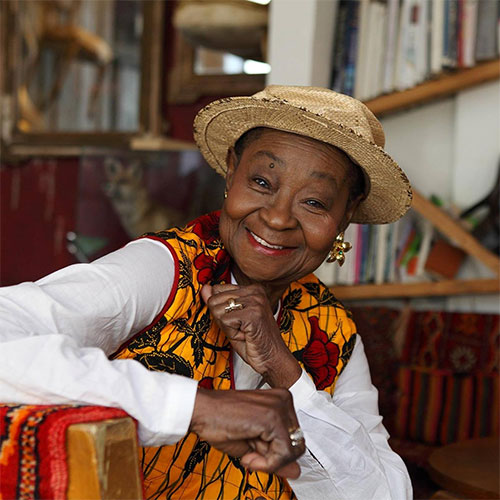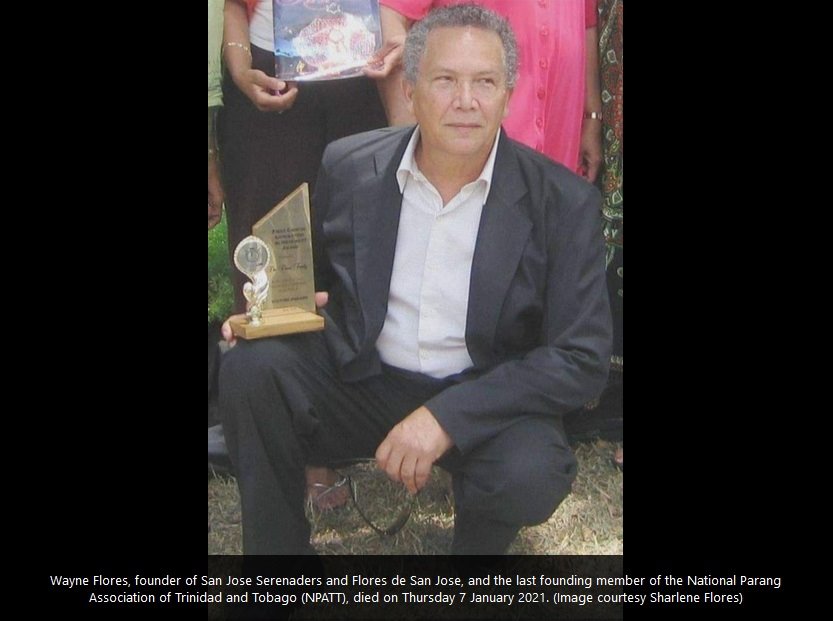|
0 Comments
A special Happy Birthday goes out to Calypsonian McCartha Linda Sandy-Lewis also known as "Calypso Rose " who celebrated her birthday on Tuesday. Calypso Rose was born on April 27th 1940.
She is an iconic cultural figure and is revered as one of the greatest Calypsonian in the world. Calypso Rose began writing songs at the age of 15, turned professional in 1964 and has composed over 800 songs and recorded over 20 albums. In 1978, the "Calypso King" competition was renamed "Calypso Monarch" in honour of Calypso Rose, who won the competition with “I Thank Thee”. She is also recognised for taking Caribbean music, particularly Calypso, to the wider world. @calypsorosediva Source: TTT Live on Line.  The parang fraternity is mourning the deaths of two of its icons within the space of two days last week Wayne Flores, the founder of San Jose Serenaders and Flores de San Jose, as well as the last founding member of the National Parang Association of Trinidad and Tobago (NPATT), died on Thursday. Two days earlier, pannist, retired teacher and founding member of Los Alumnos de San Juan, Wayne Jagdeo, died at his home in Couva, where he had been receiving palliative care after being diagnosed with lung cancer. Flores’ widow, Flores de San Jose lead singer, Sharlene Flores, broke the news of his passing in a social media post. She wrote: “Dear family, friends, treasured fans and supporters, both locally and internationally, once again I bring you all sad, painful, heartbreaking & devastating news of the passing of my dearly beloved husband Wayne Flores of 38 years marriage. At this time, words are extremely difficult and painful for me to express. Waynie (lovingly called by those who knew and loved him), left us peacefully in his sleep at home on the night of Thursday, January 7th, 2021, surrounded by his loving and dedicated family, which we give praise and thanks to the almighty for granting us this mercy. Once again, our hearts are broken into a million pieces, but with God’s mercy, we will all get through this. Words cannot express how much I love and miss my husband. “Wayne was not only a loving, kind, caring, selfless, humble person, but he was the most wonderful husband, father, grandfather, father in law, brother in law, uncle and a very loving brother, who would put others first before himself. He was a pioneer and legend in the culture of Parang music, who contributed years of hard work, sacrifice and dedication to the development of the culture of parang music in Trinidad and Tobago. He was a great musician who loved his craft dearly.” Funeral arrangements for Flores have not yet been announced. There will be a viewing for close relatives of Jagdeo at Clark and Battoo on Tragarete Road, Port-of-Spain, from 2 pm to 6 pm today. The funeral service will take place tomorrow at the Church of the Assumption, Long Circular Road, Maraval at 10 am followed by cremation at the Port-of-Spain Crematorium at 12.30 pm. The service will be live-streamed by Wack 90.1 FM and on Los Alumnos de San Juan Facebook Page.  To add to his long list of accolades, Slinger “Mighty Sparrow” Francisco will now be immortalised at the Caribbean Wax Museum in Norman Centre, Bridgetown, Barbados. The life-like depiction of the ‘Jean and Dinah’ singer will be unveiled tomorrow on the premises of The Commercial Credit Division of Consolidated Finance Co. Ltd, Barbados. The unveiling is a merged effort of the Trinidad and Tobago Association of Barbados, Corporate & Commercial Credit Division of Consolidated Finance Co. Ltd and the Caribbean Wax Museum. The Grenadian-born Francisco gained the title “Calypso King” of the world through his music. Since 1956, he has remained the only calypsonian to have won the T&T Calypso Monarch title more than anyone else—eight times. He also took the Road March title on several occasions. Francisco also took his music to the US, Europe and even Africa. For his contribution to the cultural and musical landscape of T&T and taking the art form to the world, the 85-year-old was bestowed several honours, including an honorary doctorate from the University of the West Indies in 1987, the honorary title of Chief of the Yorubas, Chaconia Gold Medal, Order of the Republic of T&T and the Order of the British Empire (OBE). Of this latest honour, Francisco yesterday told Guardian Media it was a very nice thing for the Caribbean Wax Museum to honour him in such a way. He said he was made aware of this five months ago and had no objection to it. “I have been doing my thing for a very long time. It is good to see this…I wish I could be there to see it,” he said through laughter via a telephone conversation from his US-based home. Asked whether more needed to be done in T&T honour its creatives, Francisco answered, “I think we should continue doing these things.” Meanwhile, Trinbago Unified Calypsonian Organisation (TUCO) president Lutalo “Brother” Resistance” Masimba labelled the unveiling as “timely.” Masimba said given that the honour has come during the celebration of Calypso History Month adds a certain “quality” to the celebration and fitted in nicely with its theme—Calypso Beyond Boundaries and Borders. He said TUCO was very pleased with the recognition of one of the Caribbean’s greatest calypsonians of all times. In an email interview, directors at the Caribbean Wax Museum said, “As with everywhere else in the world where Caribbean people have settled, the Mighty Sparrow set the standard against which all calypsonians are judged. Barbados’s Mighty Gabby is in many ways a protegee.” The wax figure of Francisco will join other regional artistes in the soca arena like Barbados’ Alison Hinds and Lil Rick, Barbadian-born US-based R&B singer Rihanna, as well as historical revolutionaries like Che Guevera and Fidel Castro Souce: Stabroek News, Oct 29, 2020  To add to his long list of accolades, Slinger “Mighty Sparrow” Francisco will now be immortalised at the Caribbean Wax Museum in Norman Centre, Bridgetown, Barbados. The life-like depiction of the ‘Jean and Dinah’ singer will be unveiled tomorrow on the premises of The Commercial Credit Division of Consolidated Finance Co. Ltd, Barbados. The unveiling is a merged effort of the Trinidad and Tobago Association of Barbados, Corporate & Commercial Credit Division of Consolidated Finance Co. Ltd and the Caribbean Wax Museum. The Grenadian-born Francisco gained the title “Calypso King” of the world through his music. Since 1956, he has remained the only calypsonian to have won the T&T Calypso Monarch title more than anyone else—eight times. He also took the Road March title on several occasions. Fransisco also took his music to the US, Europe and even Africa. For his contribution to the cultural and musical landscape of T&T and taking the art form to the world, the 85-year-old was bestowed several honours, including an honorary doctorate from the University of the West Indies in 1987, the honourary title of Chief of the Yorubas, Chaconia Gold Medal, Order of the Republic of T&T and the Order of the British Empire (OBE). Of this latest honour, Francisco yesterday told Guardian Media it was a very nice thing for the Caribbean Wax Museum to honour him in such a way. He said he was made aware of this five months ago and had no objection to it. “I have been doing my thing for a very long time. It is good to see this…I wish I could be there to see it,” he said through laughter via a telephone conversation from his US-based home. Asked whether more needed to be done in T&T honour its creatives, Francisco answered, “I think we should continue doing these things.” Meanwhile, Trinbago Unified Calypsonian Organisation (TUCO) president Lutalo “Brother” Resistance” Masimba labelled the unveiling as “timely.” Masimba said given that the honour has come during the celebration of Calypso History Month adds a certain “quality” to the celebration and fitted in nicely with its theme—Calypso Beyond Boundaries and Borders. He said TUCO was very pleased with the recognition of one of the Caribbean’s greatest calypsonians of all times. In an email interview, directors at the Caribbean Wax Museum said, “As with everywhere else in the world where Caribbean people have settled, the Mighty Sparrow set the standard against which all calypsonians are judged. Barbados’s Mighty Gabby is in many ways a protegee.” The wax figure of Fransico will join other regional artistes in the soca arena like Barbados’ Alison Hinds and Lil Rick, Barbadian-born US-based R&B singer Rihanna, as well as historical revolutionaries like Che Guevera and Fidel Castro. Source: T&T Guardian, Oct 30, 2020 Swallow passed away on Friday surrounded by family at his home in Willikies after suffering from a prolonged illness. He was 78.
His death has plunged the calypso fraternity across the region into mourning. The Trinbago Unified Calypsonian Organisation, the governing body for calypso in Trinidad and Tobago paid tribute to the veteran stating that he has been recognised for contributing nearly 60 years to the soca and calypso art form. "During this time the vibrant, fiery and pulsating rhythms of his soca hits have created frenzy wherever and whenever he performs," TUCO said. A four-time Calypso Monarch and five-time Road March winner in Antigua and Barbuda, King Swallow won over audiences in T&T with songs such as 'Fire in the Backseat', 'Subway Jam', 'Party In Space' and 'Satan Coming Down'. King Swallow was awarded the Order of Merit (Gold), and the Grand Cross of Princely Heritage during terms of governance under the Labour Party. Each award was conferred in recognition of his sterling contribution to the calypso art form. Nailah Blackman is among some 2,300 music professionals who were invited into the coveted membership of the Recording Academy. - SOCA songstress Nailah Blackman is now eligible to win a Grammy. The 22-year-old performer announced on her Instagram on Saturday she was invited to join the Recording Academy.
The Recording Academy is responsible for the Grammys Awards. A person cannot win or vote for the Grammys unless they are a part of the academy. This year, more than 2,300 music professionals were invited into the coveted membership. “This is the next step, the whole process I set off on three years ago. It has always been our goal to win a Grammy. This is just one step towards that goal…. I am now eligible to be nominated for a Grammy and I am now eligible to vote to get someone nominated for a Grammy,” Blackman told Newsday on Monday. In 2018 she was flown out by record executives from Def Jam Recording to meet with them. She was nominated by label reps from Universal Republic Records for membership in the Recording Academy. “I’ve been working on music for the sole purpose to make music for life, make music for Trinidad, make music for Carnival, make music for the entire world. Where we see our music going is the international realm.” This membership, Blackman said, was the third phase of her three-year plan to get international recognition. She’s been working on music not just for Carnival, but for the people who’ve never heard of Carnival, never heard of TT and never heard of soca music. “We’ve been creating this music to get into those new markets.” She’s been playing around with her sounds and apart from her soca songs she’s been creating a hybrid of soca with Afrobeats, reggaeton and pop music. “We have been sparing on when and how we release things. When I start back to release music, we are not going to stop. It is just going to be song after song. To keep the momentum going into 2021. When and how everything will be released is still in motion, but we are well prepared in terms of music.” She and her team are not sure if they are going to release a new album or singles. She’s also been quietly working on collaborations with international artists. She was hesitant to name drop many people except for Adekunle Gold, a prominent Nigerian singer. “We did a video together during this whole lockdown, in separate locations, so that video should be coming out this month. That’s the next big international project you all can look forward to.” She had another collab with a US artist she is keeping under wraps. “They are also quite popular as well, and they would bring a whole new market to me. We are throwing in everything I’m doing in an international direction, but still staying true to soca music. With the borders closed and physical distancing ensuring interactive performances for musicians being placed on hold, Blackman got a chance to rest, recuperate and also used the time to work on her music. In the past three years, Blackman has been super busy pumping out music and performing across the globe. She’s flown to more than 46 places including Jamaica, Guyana, St Lucia, New York City, Miami, Boston, Vancouver, Canada, Suriname, Belize, Paris, London and Australia. “I felt like I needed time to recuperate. I’ve been going like a machine for the last three years. I’ve spent more time on a plane than anywhere else. It was important to regroup, find myself and have a direction because I know the next time I connect with my fans, it would not be at the same level that I did before.” Though she’s had to physically distance herself from her fans, she’s kept in close communication with them through Instagram. She posts frequently to the platform for her 368,000 followers. “People feel as if they always want to see an artist perform, but they only get to know the artists as artists but not when they are home, what are they doing and their family. “Over lockdown, I’ve connected a lot more with my fans on the internet a lot more than when I was just performing all the time. I think they are seeing a different side of me. It has brought us a lot closer.” Source: Newsday, July 14, 2020 |
T&T news blogThe intent of this blog is to bring some news from home and other fun items. If you enjoy what you read, please leave us a comment.. Archives
June 2025
Categories
All
|




 RSS Feed
RSS Feed